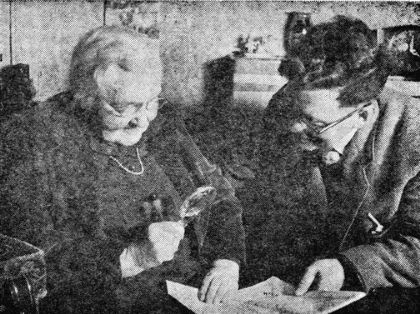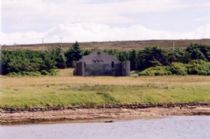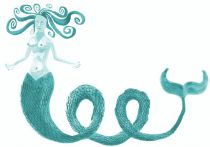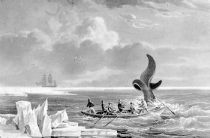Song Bios: more information on the songs (1-7)
During our two year funded project we ran 17 SongShares, which consisted of a short informal concert where local artists or folk interested in singing were encouraged to take the stage (or stay where they were!), followed by a workshop where participants were invited to join in and learn a newly rediscovered and almost forgotten Orkney song. Each song has its own story.
Dr Sarah Jane Gibbon put together the information on each of the songs taught at each workshop, and written below for you.
Bottom
Quick Links:
Stromness: The Orcadian Boatman's Song
The Hope: The Greenland Whale Fishery
Orphir: Hurrah for the Orkneys
Kirkwall: An Orcadian Cradle Song
Finstown: The Nobleman's Wedding / The Unconstant Lover
St Andrews: I'll Hang My Harp on a Willow Tree
Flotta: The Bride's Lament
The Orcadian Boatman's Song (1st Songshare, 01/11/08)
The version used as the basis of the BOSP version was recorded by the School of Scottish Studies in 1967, which was sung by Sydney Scott from North Ronaldsay. A copy is held in the Orkney Library and Archive. The song was written by the Reverend James Stormonth, missionary in Rendall in 1871 and Stenness 1871-5, after which he moved to Edinburgh. For more information on the School of Scottish Studies, click here and then choose "tocher" from the menu on the left of the page.
TOP
The Greenland Whale Fishery (2nd SongShare 06/12/08)
The BOSP version of this song is based on the version sung by John G Halcro in 1967 from South Ronaldsay and recorded for the School of Scottish Studies by Alan Bruford.
The song is classed as a sea shanty, although is probably more correctly a fo’c’sle or forebitter song, a song sung by sailors at rest rather than being sung – as a sea shanty was - to assist with synchronizing movements for working aboard ship. As they were sung at rest, they could be accompanied by fiddle or banjo. These songs were ballads and could be sentimental in nature, although this particular one is not. It is described as a traditional ballad, set in 4/4 time, solid and straight-forward, like the men who crewed the whaling ships!
It has many versions recorded from Britain, America and Canada. it was once a very popular song and is still sung today. Unlike most shanties which originated between the 1830s and 1850s, this song seems to have been first published in London before 1725. This coincides with the resurgence of the Whaling industry in the Greenland Sea.
Early version mention the ship “The Lion” and the captains name “Speedicut”, but with time these details have been lost and only the presence of the date remains, although this changes according to the version. There is no need to assume that this song tells the story of an actual event. The pattern of the song – Leaving, hunt, loss of life and return – is common and the story could be a generic whaling tale.
The earlier versions of the song grieve the loss of the whale more than the lost whalers, whilst later (American and Canadian) versions reverse the loss, mourning human life over the whale. The two Orkney versions hold the loss of the whale higher than the crew.
The presence of an apprentice boy is not found in many versions, yet unusually two versions from Orkney do: this one and one from The Orcadian in 1934.
If you found this interesting, here are a few links to whet your appetite for more!
http://www.mudcat.org/ [words and music - search for 'Orkney']
http://www.traditionalmusic.co.uk/ [mostly words, some music - again, search on 'Orkney' to find local tunes and words]
http://www.ibiblio.org/jimmy/folkden-wp/?p=7085 [a bit of a warble, but entertaining nonetheless!]
TOP
Hurrah for the Orkneys (3rd SongShare 17/01/09)

Hurrah for the Orkneys, originally sung by Henrietta Groundwater: Recorded by Ernest Marwick – OA: D31/TR/120 (Read Henrietta's obituary written by Ernest here)
So far we have found only one version of this song which is that sung by Henrietta Groundwater when she was 84 years old. She does not give the author of the song, but it is possible that either she or her father wrote it as the verse fits with their family backgrounds (fitting better with the background of her father than herself). Also, Henrietta was regular contributor to the local newspapers writing letters and poetry under the pseudonyms of “Thorald” and “Islender”.
Henrietta was one of the youngest of at least 12 children born of Alexander Groundwater. She was born at 11.30pm on Saturday 17th April 1880 in Kirkwall, although her family home was in Harray until she was about five, after which she was brought up in Kirkwall. She died in May 1971. When Henrietta was in her 80s she wrote a history of her family which was published in 1967 by the Kirkwall Press entitled Memories of an Orkney Family. This wonderful little book recounts stories told to Henrietta by her father and mother as well as her own childhood recollections.
Henrietta’s father, Alexander, was born on 31st July 1819 and made his living as a farmer. He lived in various farms in Orphir including Piggar, Dyke End, Gyre, Yarpha, Naversdale and Oback. He also spent a short time as a servant at Lingro in St Ola, and owned for 6 years Comely Bank in Harray before finally retiring toKirkwall. He twice considered emigrating but for various reasons never did so.
If anyone has any further information about who wrote this song and whether there were any more verses we would be delighted to hear from you. I would love to know whether it was penned by Henrietta or her father, or maybe someone else entirely.
We hope you enjoy this version of the song, which Aimee has arranged and Alex has written the guitar accompaniment for.
'Memories of an Orkney Family' is available in our library, or by clicking here.
TOP
An Orcadian Cradle Song (4th Songshare, 31/01/09)
A bit of a change of pace for our fourth Songshare, with a poem chosen by Brian Cromarty from An Anthology of Orkney Verse (published 1949). Brian wrote the music to accompany 'An Orcadian Cradle Song' (page 165) as although it was titled a 'song', no tune was known. The author of the words, Rev Robert Menzies Fergusson, spent two summers in Flotta as a student minister in the 1870s. He was interested in language, culture and history, and wrote a travelogue which includes mention of his time in Orkney. As well as collecting local customs and songs, he wrote several pieces of poetry using the dialect he encountered. One such piece was his “Orcadian Cradle Song” which exhibits dialectical characteristics recognisable to the South Isles of Orkney. Fergusson also collected one of the earliest Orkney versions of The Selkie of Sule Skerry which seemingly also came from the South Isles. Another of Fergusson’s poems The Swa o’ the sea, was put to music by Sandy Windwick and sung by Angus Findlater in the mid-1900s. Both poems appear in Ernest Marwick’s edited volume An Anthology of Orkney Verse, published in 1949.
Fergusson’s travelogue in which he describes Orkney is entitles Rambling Sketches in the Far North and Orcadian Musings, published 1883. See also Rambles in the Far North, published 1884.
TOP
The Nobleman's Wedding / The Unconstant Lover (5th Songshare, 14/02/09)
It happened to be at a very rich wedding…
Nobleman’s Wedding; The Faultless Bride; The Love Token; The Unconstant Lover
As the various titles suggest, this song tells of a maid who rather than wait for her beloved who is away, marries another. Her former lover attends her wedding in disguise and reveals himself to her through song. In this Orkney version she is so overcome with the revelation that she takes to her bed and dies before morning.
Versions of this song have been found in South England, Canada and further afield. The earliest recorded Scottish version dates from 1855, although there is an indication that the Broadside Ballad may have been based on a theatre song of the 1670s. Although the words vary the sentiment remains constant in all versions.
This version was arranged by Aimee and Alex, and was based on a recording held in the Orkney Library and Archive. The singer was Mr Sidney Scott fromNorth Ronaldsay and he was recorded by Ms Ann Marwick in the 1980s when he was an elderly gentleman. He believed the song told of an event which occurred locally a long time ago and said that it was popular at weddings.
The following links provide further information on the song and several other versions: -
http://www.mudcat.org/thread.cfm?threadid=23329
http://www.mudcat.org/@displaysong.cfm?SongID=4264
http://www.contemplator.com/ireland/nwedding.html
http://www.metrolyrics.com/the-noblemans-wedding-lyrics-clandestine.html
http://sniff.numachi.com/pages/tiNOBLEWED.html
http://www.sligotradsingers.ie/songs.htm
Top
I’ll Hang My Harp (6th SongShare 28/02/09)
I’ll Hang My Harp on a Weeping Willow: This has joined the ranks of the BOSP because a version sung by Sydney Scott was unearthed in the archives.
This very sad song tells the story of a young man who leaves his life as a soldier to become a minstrel in order to be with his love, who is of noble birth. She then marries another and so heartbroken he decides to return to the war, with little care of living or dying.
The song seems to be a poem “I’ll hang my harp on a willow tree” written by Thomas Haynes Bayley (1795-1839) with music composed by William Guernsey (1817-1885). Thomas Bayley, although not well known today was one of the most popular songwriters of his time. There are several different tunes associated with the many versions of the song.
The earliest extant version of the song dates from c.1846 and was published inPhiladelphia, . Several other American published versions appear in the 1840s and 50s. The earliest English version dates from the late 1880s and was published in London.
Some Links to the versions and history of the song can be found at the following websites: -
http://www.memory.loc.gov/ammem/sm2html/sm1820Titles54.html
http://www.ibiblio.org/folkindex/i04.htm
http://www.lyon.edu/wolfcollection/songs/riddleweeping1240.html
http://www.wtv-zone.com/phyrst/audio/nfld/20/harp.htm
http://www.mudcat.org/thread.cfm?threadid=35
http://catalogue.nla.gov.au/Record/1116056
Listen particularly to the third link in the list above as it has a fantastic bluesey, bluegrassy, country style version of this very beautiful song!
TOP
The Bride's Lament (7th Songshare, 14/03/09)
Alternative title(s): The Sailor and his Bride; The Mermaid Song
 Check out the absolutely fabulous online Flotta Web Guide.
Check out the absolutely fabulous online Flotta Web Guide.
The version BOSP taught and performed was based on a recording by Sydney Scott found in the Orkney Library and Archive and recorded by theSchoolofScottish Studiesin 1967. Other versions of the song were collected from the East Mainland of Orkney by theSchoolofScottish Studiesat the same time, although these have not yet been sourced by BOSP.
This is yet another beautiful sad song which tells the tale of lost love. A sailor and his love marry, soon after which he returns to sea and is lost in a storm. The bride pines for her lost love, wishing she were with him.
 The song mentions mermaids which is relatively unusual.
The song mentions mermaids which is relatively unusual.
Although thought by some to be of British origin, most examples of this song, so far found, come from and date from the 1850s to the early 1900s. There are also several Canadian versions, two of which date to the 1880s.
The song seems to have originated in oral tradition and early versions differ considerably from each other, although they usually have six or seven stanzas and no refrain. Later versions tend to have five stanzas and a refrain and most closely resemble a broadside published by DeMarsan of New York sometime between 1860 and 1878.
As you will hear, our version has a refrain and if you look at the links below you will see the words are very similar to the later American and Canadian recorded versions. Consequently it is possible that this Orkney version dates from after 1870 and could have reached Orkney by way of America or Canada.
See the following links for other versions and an article about the song:-
Versions of the song:
http://mudcat.org/@displaysong.cfm?SongID=6928
http://www.traditionalmusic.co.uk/song-midis/Sailor_and_His_Bride.htm
http://sniff.numachi.com/pages/ttSAILBRID.html
http://sniff.numachi.com/pages/tiSAILBRDE;ttSAILBRDE.html
Index of references to the song “The Sailor and His Bride [Laws K10/Me I-A18]”
http://www.ibiblio.org/folkindex/s01.htm
Article: “The Sailor’s Bride” by Edith Fowke http://cfmb.icaap.org/content/1980/3.4/19-Music_Sailor's_Bride.pdf

